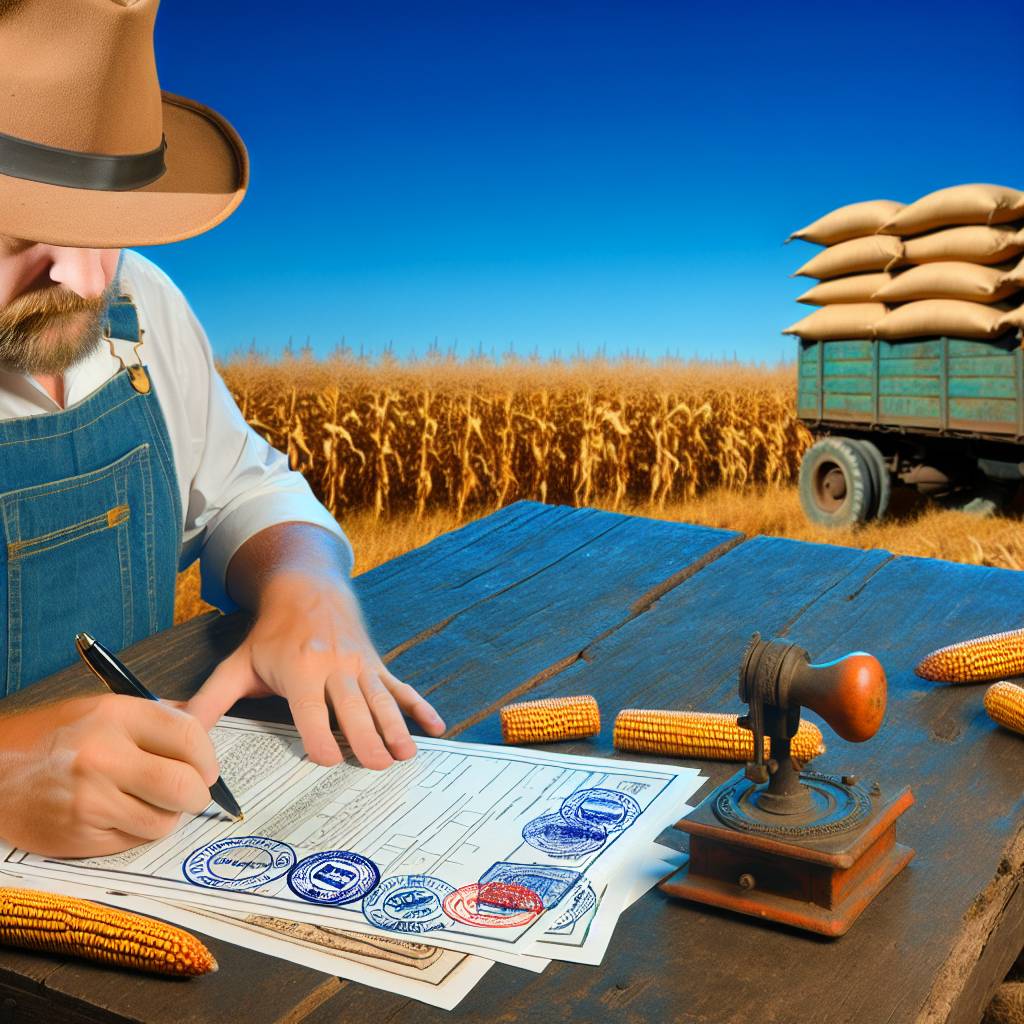Introduction to Import and Export Regulations in Modern Farming
Import and export regulations significantly impact modern farming practices.
These regulations ensure safety, quality, and compliance in agricultural trade.
Farmers must navigate complex legal frameworks to remain competitive.
Non-compliance can lead to severe penalties and market restrictions.
Understanding the Importance of Compliance
Compliance with import and export regulations is vital for success.
Adhering to these rules helps maintain product quality while safeguarding public health.
It also fosters trust among consumers and trading partners.
Moreover, compliance can open new markets for agricultural products.
Farmers who understand these regulations have a significant advantage.
Key Regulatory Bodies and Their Roles
Various agencies oversee import and export regulations globally.
In the United States, the Department of Agriculture plays a significant role.
This agency ensures that agricultural products meet safety standards.
Additionally, the U.S. Customs and Border Protection monitors cross-border trade.
Understanding these agencies’ functions is essential for compliance.
Challenges Farmers Face
Farmers frequently encounter challenges in complying with regulations.
Transform Your Agribusiness
Unlock your farm's potential with expert advice tailored to your needs. Get actionable steps that drive real results.
Get StartedChanging laws can create confusion and uncertainty in trade practices.
Additionally, regional differences in regulations can complicate matters.
Access to information is often limited, making compliance difficult.
Small-scale farmers may struggle more than large corporations.
Strategies for Effective Compliance
Farmers can implement several strategies to ensure compliance.
Staying informed about regulations is the first step.
Participating in workshops and training programs proves beneficial.
Furthermore, collaborating with legal experts can provide clarity.
Investing in compliance technologies can streamline processes.
Future Trends in Import and Export Regulations
The landscape of import and export regulations is evolving rapidly.
With advancements in technology, regulations are becoming more systematic.
Moreover, sustainability is becoming a focal point in regulatory practices.
Future regulations may place higher emphasis on environmental impacts.
Farmers must remain adaptable to these changing trends.
Key International Trade Agreements Affecting Agricultural Exports
Understanding Trade Agreements
Trade agreements significantly shape agricultural exports worldwide.
They establish the rules for international trade between countries.
These agreements help to reduce tariffs and trade barriers.
As a result, farmers can access new markets more easily.
Types of Trade Agreements
There are several types of trade agreements that influence agriculture.
- Bilateral agreements involve two countries negotiating terms.
- Multilateral agreements involve multiple countries working together.
- Regional agreements focus on a specific geographic area.
Each type has unique benefits and challenges.
Impact of the North American Free Trade Agreement
The North American Free Trade Agreement (NAFTA) reshaped agricultural trade in North America.
It facilitated trade between the United States, Canada, and Mexico.
NAFTA led to significant increases in U.S. agricultural exports.
Moreover, it allowed farmers to sell their products more competitively.
Showcase Your Farming Business
Publish your professional farming services profile on our blog for a one-time fee of $200 and reach a dedicated audience of farmers and agribusiness owners.
Publish Your ProfileEuropean Union Trade Policies
The European Union (EU) implements robust trade policies affecting agriculture.
EU agreements prioritize food safety and environmental standards.
This ensures that imported agricultural products meet high quality criteria.
Consequently, EU farmers may benefit from reduced competition.
Significance of the Comprehensive and Progressive Agreement for Trans-Pacific Partnership
The Comprehensive and Progressive Agreement for Trans-Pacific Partnership (CPTPP) enhances trade across the Asia-Pacific region.
This agreement lowers tariffs on various agricultural products.
It benefits countries like Japan, Australia, and Canada with stronger agricultural markets.
Farmers can access broader markets for their goods as a result.
Challenges in Complying with Trade Agreements
Adhering to international trade agreements poses challenges for farmers.
Regulations may vary significantly from one agreement to another.
Farmers must stay informed about compliance requirements.
This can require additional resources and administrative efforts.
The Future of Agricultural Trade Agreements
The future landscape of agricultural trade is evolving rapidly.
Emerging markets are becoming increasingly vital.
Furthermore, global challenges like climate change impact trade policies.
Staying updated on trade agreements is essential for modern farmers.
Understanding Different Regulatory Bodies and Their Roles
Overview of Key Regulatory Bodies
Numerous regulatory bodies oversee import and export regulations in agriculture.
Each organization plays a crucial role in maintaining safety and compliance.
Understanding these bodies is essential for modern farmers.
United States Department of Agriculture
The United States Department of Agriculture (USDA) governs agricultural exports.
It ensures that products meet both domestic and international standards.
The USDA also offers resources and assistance to farmers navigating regulations.
Food and Drug Administration
The Food and Drug Administration (FDA) regulates food safety in imports and exports.
Its guidelines help protect public health by ensuring food quality.
Farmers must comply with FDA regulations to target international markets.
Customs and Border Protection
Customs and Border Protection (CBP) enforces laws related to border security.
They oversee the importation and exportation of agricultural products.
Farmers must adhere to guidelines to avoid fines and penalties.
International Trade Administration
The International Trade Administration (ITA) supports U.S. exports worldwide.
It provides tools and data to help farmers understand market opportunities.
Farmers can leverage ITA resources for successful trades abroad.
Environmental Protection Agency
The Environmental Protection Agency (EPA) regulates agricultural chemicals.
Its regulations affect both domestic use and international shipment of products.
Staying compliant with EPA standards prevents legal issues for farmers.
Learn More: Comprehensive Overview of Agricultural R&D Funding Opportunities for Farmers
Necessary Documentation and Paperwork for Importing and Exporting
Understanding Import-Export Documentation
Importing and exporting agricultural products requires specific documentation.
This paperwork ensures compliance with national and international regulations.
Failing to provide proper documentation can lead to fines and delays.
Essential Import Documents
For importing goods, several key documents are essential.
- The Bill of Lading is crucial for transporting goods securely.
- The Commercial Invoice outlines the sales transaction details.
- A Packing List describes the items included in the shipment.
- Import Permits authorize the goods being brought into the country.
Each document plays a vital role in the import process.
Showcase Your Farming Business
Publish your professional farming services profile on our blog for a one-time fee of $200 and reach a dedicated audience of farmers and agribusiness owners.
Publish Your ProfileEssential Export Documents
Exporting products also requires a set of important documents.
- The Export License permits the export of regulated goods.
- The Shipper’s Export Declaration declares details to customs.
- An Export Invoice specifies the pricing and terms of sale.
- Certificates of Origin verify where the products were made.
These documents help streamline the export process and reduce issues.
Regulatory Compliance
Compliance with local and international regulations is mandatory.
It is crucial to stay updated on changes in trade laws.
Non-compliance may result in legal actions or fines.
Engaging a compliance expert can mitigate these risks.
Importance of Accurate Record-Keeping
Accurate record-keeping is essential for both importers and exporters.
This includes maintaining copies of all documentation.
Such records help in audits and resolving disputes if necessary.
Implementing a robust data management system is advisable.
Gain More Insights: Food Safety Certification Processes for Farmers
Common Compliance Challenges Faced by Farmers in International Trade
Complex Regulations
Farmers often encounter complex regulations while trading internationally.
Different countries impose varying rules on imports and exports.
This complexity can lead to unintentional violations.
Moreover, keeping updated with changing regulations proves challenging.
Documentation Requirements
Proper documentation is crucial for international trade compliance.
Farmers need to prepare export licenses and phytosanitary certificates.
Missing or incorrect documents can delay shipments significantly.
Consequently, this can result in financial losses.
Customs Procedures
Navigating customs procedures is often a daunting task.
Farmers must understand local and international customs laws.
Failure to comply can lead to fines or seizure of goods.
Additionally, delays in customs clearance can disrupt supply chains.
Trade Tariffs and Duties
Understanding trade tariffs and duties is essential for cost management.
Farmers must factor in additional costs when pricing products.
Unforeseen tariffs can impact profit margins significantly.
Moreover, fluctuating trade policies can complicate budgeting.
Quality Standards
Different markets have varying quality standards for agricultural products.
Farmers need to ensure their products meet these requirements.
Non-compliance can result in rejected shipments.
Additionally, it can tarnish a farmer’s reputation in the market.
Sustainability Regulations
Sustainability is increasingly becoming a focal point in international trade.
Farmers must adhere to environmentally friendly practices.
Non-compliance can lead to bans or penalties from importing countries.
As such, keeping sustainable practices at the forefront is essential.
Access to Information
Many farmers struggle with limited access to relevant compliance information.
This lack of knowledge can hinder their ability to stay compliant.
Building relationships with trade organizations can help bridge this gap.
Furthermore, leveraging technology can provide valuable insights.
Explore Further: Maximizing Farm Potential Through Effective Rural Development Policies
Showcase Your Farming Business
Publish your professional farming services profile on our blog for a one-time fee of $200 and reach a dedicated audience of farmers and agribusiness owners.
Publish Your Profile
Best Practices for Staying Updated on Regulatory Changes
Utilizing Reliable Sources for Information
Farmers should regularly check government websites for updates.
Official agencies provide the most accurate regulatory changes.
Furthermore, industry associations often share relevant updates.
Subscribing to newsletters keeps farmers informed about new regulations.
Additionally, following reputable agricultural news outlets can be beneficial.
Engaging with Professional Networks
Joining local farming groups encourages information sharing.
Networking can lead to valuable insights about regulatory trends.
Furthermore, attending agricultural conferences provides learning opportunities.
These events often feature discussions on current regulations.
Being active in organizations fosters connections with other farmers.
Regular Training and Education
Farmers should participate in workshops focused on compliance.
These educational sessions cover the latest regulatory updates.
Additionally, online courses offer flexibility for busy schedules.
Moreover, training sessions often feature industry experts.
Continual education enhances overall understanding of regulations.
Establishing a Compliance System
Creating a systematic approach to compliance improves efficiency.
Farmers can develop checklists for required documentation.
Regular audits of operations ensure adherence to regulations.
Utilizing software to track compliance activities may also help.
Such systems simplify the monitoring of regulatory changes.
Staying Proactive with Legal Advice
Consulting with legal experts ensures understanding of regulations.
Attorneys specializing in agricultural law can provide guidance.
Engaging legal counsel helps navigate complex regulations.
Furthermore, staying informed about potential legal changes is crucial.
Developing a relationship with a legal advisor can aid in compliance.
See Related Content: Integrating Food Safety Standards into Farm Operations
The Role of Technology in Streamlining Compliance Processes
Adopting Digital Solutions
Farmers increasingly adopt digital solutions to meet compliance demands.
These tools enhance traceability in the supply chain.
Moreover, they simplify documentation and reporting requirements.
By using software platforms, farmers can automate compliance checks.
This automation reduces the chances of errors and omissions.
Integrating Data Management Systems
Data management systems play a crucial role in compliance.
They help farmers track regulations and changes in real-time.
Through effective data management, stakeholders can ensure transparency.
This practice builds trust among consumers and regulatory bodies.
Additionally, farmers can efficiently manage inventories and shipments.
Leveraging Mobile Applications
Mobile apps have transformed compliance processes in modern farming.
These applications allow farmers to access regulations on the go.
Furthermore, they enable quick reporting of compliance status.
Users can receive alerts on upcoming regulatory deadlines.
Showcase Your Farming Business
Publish your professional farming services profile on our blog for a one-time fee of $200 and reach a dedicated audience of farmers and agribusiness owners.
Publish Your ProfileThis feature keeps farmers informed and proactive in their operations.
Utilizing Cloud Technology
Cloud technology enhances collaboration between different stakeholders.
It allows seamless data sharing among farmers, suppliers, and regulators.
As a result, everyone stays aligned with compliance requirements.
Cloud platforms also offer scalability for growing farming operations.
Farmers benefit from reduced IT costs and increased efficiency.
Implementing AI and Analytics
Artificial intelligence plays a significant role in compliance management.
AI can analyze vast amounts of data to identify compliance risks.
This capability enables farmers to make informed decisions.
Furthermore, analytics provide insights into improving compliance processes.
By leveraging technology, farmers enhance their overall efficiency.
Case Studies: Successful Compliance Strategies in Farming Exports
Strategic Planning by Riverbend Farms
Riverbend Farms adopted a meticulous compliance approach.
They ensured all produce met international safety standards.
This proactive strategy minimized potential export delays.
Moreover, they conducted regular audits to maintain compliance.
Such diligence fostered trust among international buyers.
Innovation at Green Valley Agro
Green Valley Agro embraced technology to enhance compliance.
They implemented an automated tracking system for shipments.
This innovation provided real-time updates on regulatory changes.
Additionally, their team underwent regular compliance training.
This practice ensured all employees were informed and prepared.
Collaboration with Local Authorities by Fresh Farms
Fresh Farms built strong ties with local trade authorities.
They sought guidance on import-export regulations regularly.
This collaboration streamlined the compliance process significantly.
Furthermore, Fresh Farms stayed updated on policy changes.
As a result, their export operations became more efficient.
Learning from Challenges
Many farmers initially struggle with regulatory requirements.
Failure to comply can lead to hefty fines and delays.
However, these challenges frequently lead to valuable lessons.
For instance, farmers often adjust practices based on feedback.
This adaptability ultimately enhances overall compliance efforts.
Case Study Impact
Each case demonstrates unique strategies for compliance.
These successful examples can inspire other farming operations.
By learning from one another, farmers can streamline exports.
Collaboration and innovation undoubtedly pave the way forward.
Ultimately, compliance leads to sustainable growth in agriculture.
Additional Resources
Basic Importing and Exporting | U.S. Customs and Border Protection




